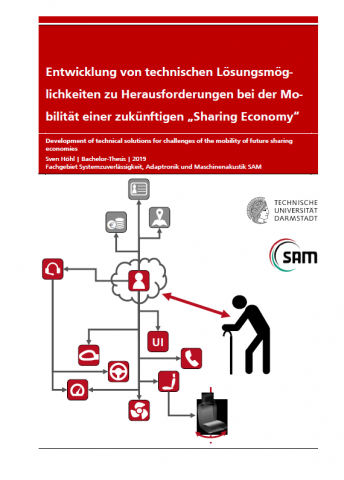Entwicklung von technischen Lösungsmög-lichkeiten zu Herausforderungen bei der Mo-bilität einer zukünftigen „Sharing Economy“ (Development of technical solutions for challenges of the mobility of future sharing economies)
Author: Sven Höhl
Bachelor-Thesis | 2019
Fachgebiet Systemzuverlässigkeit, Adaptronik und Maschinenakustik SAM
The goal of this thesis is to develop two to three product features for mobility products that en-hance the user experience in the context of future sharing economies, with a targeted timeframe of 2025-2035 and a focus on Germany. Those features are to address challenges of future mobility. To gain an idea of such challenges, three current trends in society, other than the trend towards shar-ing economy itself, can be identified to presumably affect mobility during the targeted timeframe. First is an increasing ecological awareness, due to the necessity to contain the effects of climate change. Man-made climate change is caused by the emission of greenhouse gases, the most promi-nent being carbon dioxide. And since transportation is responsible for roughly 20 percent of the greenhouse gas emission in Germany, new concepts and regulations are developed to reduce emis-sions [1]. The second trend is digitalization. In the context of mobility, this results in increasing connectivity of the vehicles, as well as advancements in automated driving. The last trend is demo-graphic change. People in Germany live longer than before, and so over time the society contains a larger percentage of old people [2]. Therefore, many aspects of daily life, including mobility, must increasingly consider their needs. Considering these trends, future mobility can be expected to be greener and more connected. It will also have to pay more attention to old people. Sharing econo-my, regarding mobility for example in the form of carsharing, benefits from the first two trends, since it requires connected vehicles and can be a way to reduce overall emissions. However, it cur-rently fails to address old people [3]. To conclude, the developed product features should address problems within the field described above.
To systematically develop those features, this thesis consists of four phases; the research phase, the definition phase, the concept phase and the specification phase. The research phase determines an approach for methodical product development and obtains an overview of the state of the art. Fol-lowing is the definition phase, which helps to specify the task by determining requirements. In the subsequent concept phase, product concepts are generated. Finally, the most promising concepts will be further specified and detailed in the definition phase. Basis for this development process is the VDI guideline 2221, along with its supplement sheet 2.
The structure of the following text follows the stated approach. In chapter two, the results of the research phase are presented, including information on the chosen model for product development, a discussion of the term sharing economies, as well as an overview on trends in society and tech-nology. Chapter three explains the development process, beginning with the determination of stakeholders and requirements, followed by a functional analysis and subsequently the generation of concept ideas. In the last section of the chapter, the three final product features are presented in detail. The thesis closes with a conclusion in chapter four.

